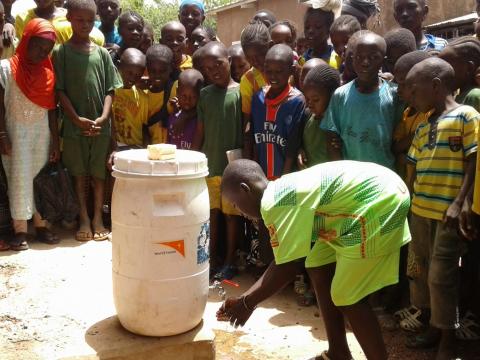Muddy pond water no more: the new Fongolimbi borehole

Today water has become a strategic issue. The region of Kedougou remains one where water scarcity remains acutely severe. Current levels of poverty in the region serve to further expose the most vulnerable sectors of society: the elderly, the handicapped, women and children.
Conditions in the area around Fongolimbi for example are dominated by very infrequent access to water. This has driven local people to resort to open water sources such as ponds and rivers for drinking and cooking, especially in the rainy season.
Fongo WASH and Maternal Health, bringing hope and change
In partnership with World Vision Korea, World Vision Senegal has developed an innovative project called ‘Fongo WASH and Maternal Health’ for a duration of three years, from October 2015 to September 2018. The aim of this project is to contribute to the improvement of infant and baby health in the Kedougou region through:
- access to drinking water and health services
- behaviour change
- care for illnesses caused by consumption of non-drinking water
“Several programmes have attempted to sink boreholes but were prevented by the hardness of the rock. Very recently the government tried to get through but with little joy. But thanks to the Fongo WASH and Maternal Health project, the issue of water is one that we can put behind us,” affirms Djibi Souare, the village head of Wallan Sinthiou. The area is one of the least accessible in the country, where obtaining a supply of water is an assault course for women and children.
They have to traverse several kilometres of dense forest in order to collect a bowlful of muddy water, polluted and unfit for consumption. The nature of the ground in this area is bedrock. The local people collect rainwater and this is what they drink.
“Formerly, women would leave home at 5am for a seven kilometre round-trip in order to find a water point that was also used by domesticated and wild animals. Now, thanks to this project, we have a borehole right here in the village. Water has become much less of a chore. We have more time to devote to other pursuits and to develop revenue-generating activities. Our children are able to go to school,” continues Djibi Souare.
The quest for the blue gold
Lack of water has become a factor which will lead a population to up sticks and move on to create a new habitation which is nearer to water points, leaving their whole history behind them. The head of the village Niagalan Rounde, Thierno Abass Diallo has witnessed this effect: “the people of the village of Niagalan <Roundé> (meaning the cast ones) left the village in the Kafory area situated about fifteen kilometres away in order to create this village in 1939. Numerous programmes have pitched up here promising boreholes but one has come to anything. The women were having to cover many kilometres or run all the risks of crossing the border into Guinea to find a water supply. And then, what water!”
“A blaze in the middle of April tore through my house because we didn’t have enough water to put it out” points out one inhabitant of the village of Madihou Roundé.
According to the Mayor of Fongolimbi, Mr Samba Camara, ‘the Fongo WASH and Maternal Health project is shaping up now and has given a new image to the Fongolimbi area. The local population can now gain access to drinking water and prevent numerous water-borne illnesses. The whole community is committed to the success of the project and we thank World Vision for all the efforts that they have made to enable our communities to find a better quality of life.”
Promoting hygiene at school
Mindful of providing the best conditions for security, hygiene and well-being for schoolchildren, the Fongo WASH and Maternal Health project has constructed hygiene blocks and supplied hygiene equipment to the schools of the area. “Almost 20 schools have benefitted from the installation of latrines and the supply of hygiene equipment with the Fongo WASH and Maternal Health project. It has enabled us to clamp down open-air toilet habits in several establishments” underlines Fode Keita, the Mayor of Dimboli.
Looking forward, between now and 2018 about 15 boreholes will be sunk and about another fifteen will be renovated. This will form a response to the main preoccupations regarding water, hygiene and sanitation.
Photos Credits: Diatta KANE, Fongo Wash and maternal Health Project Coordinator


